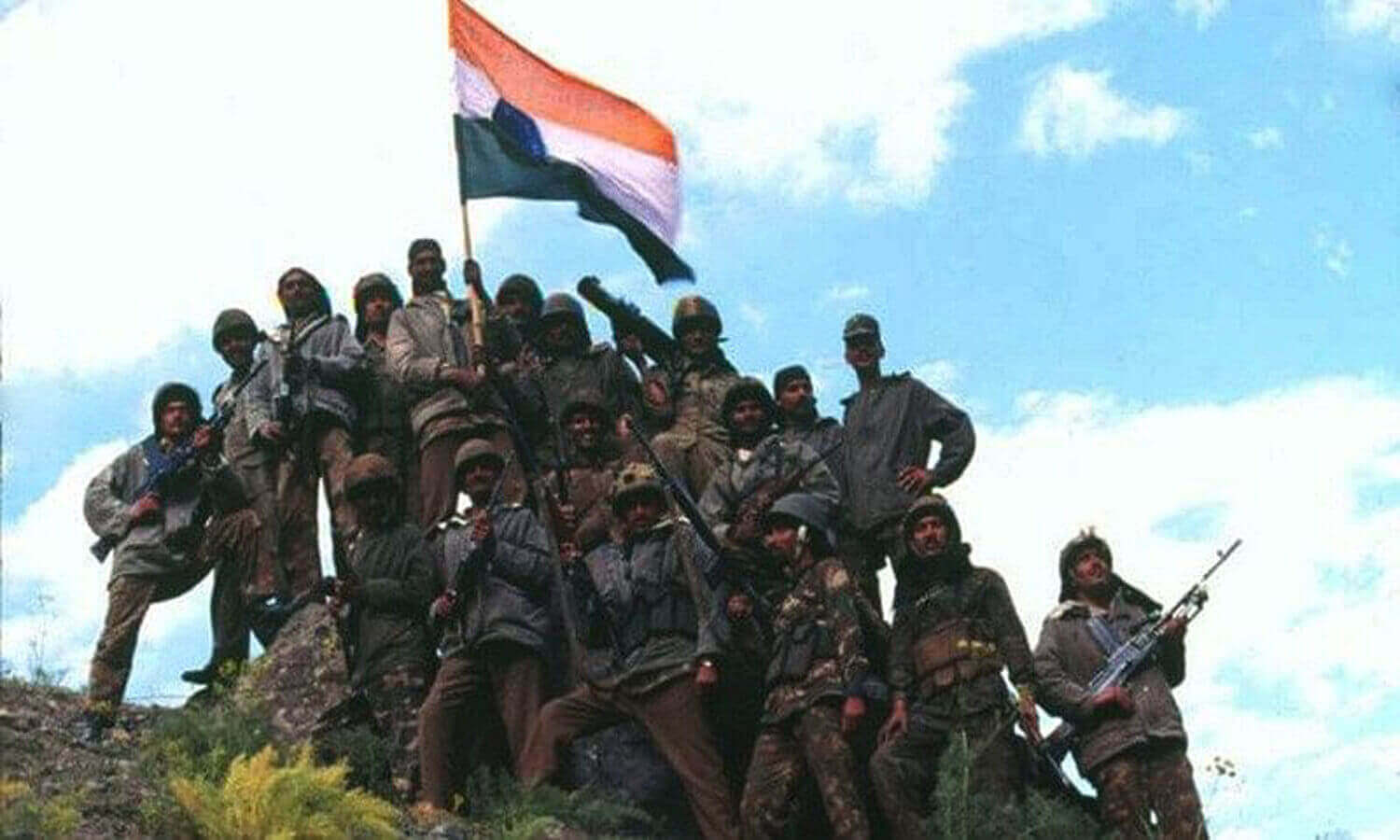
Kargil: A Matter of Honour
Mon, 26 Jul 2021 | Reading Time: 5 minutes

Kargil: A Matter of Honour
Major Gaurav Arya (Retd)
They say it was the Bakarwal goat herders who first saw Pakistani intruders on the heights of Kargil. Mostly Muslim goatherders, Bakarwals have, for thousands of years roamed the Pir Panjal ranges for grazing ground. It was in the early summer of 1999, when a group of them came across cigarette packets and wrappers bearing Pakistani Army markings. They also saw Mujahedeen, literally meaning Holy Warriors, euphuism for Pakistani terrorists. The Bakarwals reported it immediately to the closest Indian Army formation.
The Indian Army responded by sending out patrols. All this was happening at the backdrop of Atal Bihari Vajpayee’s Pakistan visit. Vajpayee, that eternal statesman, stood at Minar-e-Pakistan and did what many Pakistani thinkers believed that India would never do. In many ways, he acknowledged the existence of Pakistan. While both nations have traditionally had High Commissions and mostly full diplomatic relations, Pakistanis have always believed that deep down, India has never accepted its existence.
Vajpayee reached out to Pakistan, putting his political equity at stake. In a macabre twist, Jamaat-e-Islami, a radical Islamist political outfit, washed the Minar-e-Pakistan with rose water; apparently the visit of an infidel had desecrated the monument.
While many contacts between Indian patrols and Pakistani held positions had come to light, the scale and scope of the intrusions were not fully appreciated. It was in May 1999, that Captain Saurabh Kalia led a patrol to Bajrang Post. His patrol was fired upon by the Pakistanis. The Indian patrol soon ran out of ammunition. They were surrounded by the enemy and taken Prisoner of War. Sepoys Arjun Ram, Bhanwar Lal, Bhika Ram, Moola Ram and Naresh Singh were also taken prisoners. Between 15th May and 7th June, they were subjected to horrific torture. Their dead bodies were handed over to the Indian Army. The post-mortem examinations revealed the extent of the brutality inflicted upon them; eyes removed, lips cut, teeth broken, eardrums punctured, fractured skulls and amputated limbs and genitalia.
The enormity of what had happened was telecast live into Indian drawing rooms. They say that there is a national mood for war. The mood in India was fast turning ugly. Most Indians saw the Pakistani act as not just barbaric, but also acutely dishonourable.
India went to war.
It is important to know why Kargil happened. Pakistan was never able to reconcile with its dismemberment in 1971 and the terrorism in Kashmir was a direct result of that. More recently, it was the humiliation of the Indian takeover of the Siachen Glacier in 1984. There is an unconfirmed story of the then Pakistani Prime Minister Benazir Bhutto, furiously storming into GHQ, Rawalpindi a few years later. The legend is that she walked into a General’s office and in a scene typical of Bollywood of the eighties, threw bangles on the General’s desk. Grossly patriarchal, you might say. Well, it was the late eighties, and it was in Pakistan. I don’t know if this story is true, but like all stories from Pakistan, we may never know. The Pakistan Army attacked Siachen in waves, in a desperate attempt to wrest control from the Indians. To this day, the Pakistanis do not control one square inch of the glacier.
After the 1971 war, it was decided between India and Pakistan that the “winter vacation” of posts would happen in certain areas along the Line of Control. The terrain and the weather were simply too ferocious and cruel. Both armies decided not to subject their men to such extreme conditions and the mutually agreed solution was that both sides would vacate their respective posts in winters and re-occupy them in summers. It was all going perfectly well, until Pakistan broke faith in 1999.
Again, this begs the question, why? It is believed that one of the officers responsible for Pakistan’s Siachen debacle was a certain Brigadier Pervez Musharraf. The humiliation must have been tremendous. As Musharraf climbed the ranks of the Pakistan Army, it is said that he gave at least two proposals to carry out operations in the Kargil area. His proposals were shot down; it was thought to be an invitation to open war. Musharraf did not lose hope. His opening would come when Nawaz Sharif appointed him Chief of Army Staff of the Pakistan Army. As Army Chief, he had powers that mortals could only dream of. In 1999, Operation Badr was taken out from cold storage and Musharraf launched his army into battle.
We have all heard stories of the Indian Army’s valour and courage. Captain Manoj Pandey, Captain Vikram Batra, Rifleman Sanjay Kumar and Grenadier Yogendra Yadav won the Param Veer Chakra. We lost 527 brave hearts. To tell you stories of some and not of the others would be a disservice to all who fought at Kargil.
I have served in high altitude areas and can tell you one thing with all certainty; standing for a few minutes at 16,000 feet above sea level is a huge challenge. For a mere mortal like me, it is impossible to fathom what feats of daredevilry were accomplished by our soldiers. When people ask me to tell stories of Kargil, I sometimes feel unworthy. I was not there. I have been a soldier, but Kargil is beyond my imagination.
At those cruel heights, the Pakistanis didn’t need to fire at us. They would simply roll down huge boulders and our soldiers would die. In pitch dark and super-high altitudes, in temperatures touching minus twenty-five degrees, the Indian Army officers and soldiers fought like men possessed. Hungry, cold, and weary, they did not quit; not till the last intruder was thrown out of Indian territory on 26th July 1999. And it all started with a half-baked Pakistani plan to somehow cut off NH 1A, to squeeze lines of supply and communication to Siachen and maybe internationalise Kashmir along the way.
Batalik Sector, Tololing, Tiger Hill, Jubar Heights, Point 4875 and many other points on a “fauji map”, hitherto unknown, passed on into the mists of legend.
Nawaz Sharif’s hurried visit to Washington to meet Bill Clinton and beg for intervention and his subsequent ouster at the hands of General Pervez Musharraf are now documented, discussed, and dissected. Kargil was a war for India. For Pakistan, it was much, much more. It was Pakistan’s descent into chaos. More than a decade of martial law followed. Pakistan has never been the same again. As it stands on the very verge of implosion, its descent can be attributed to Kashmir and Kargil.
Today, we celebrate our martyrs. We celebrate those who fought the good fight. Above all, we celebrate the Indian soldier who selflessly guards our nation in driving snow, burning sand and falling rain. The Indian soldier is renowned not just for his fighting prowess and bravery. He has always demonstrated honourable conduct; in burying the enemy dead with full military honours, in treating prisoners of war with dignity and in not initiating acts of vengeance against an outnumbered enemy. The Indian Army is not just a powerful army, it is also a moral army.
This Kargil Vijay Diwas, let us not simply congratulate ourselves on a military victory. Let us remember the soldier. Let us be worthy of his sacrifice. Let us be Indians, worth fighting for.
Jai Hind.
**********
Author

Major Gaurav Arya (Retd) is Editor-in-Chief of Chanakya Forum. A noted public speaker, he was invited to speak at the UK Parliament in October 2017, where he articulated India’s stand on Kashmir. He is a keen writer.
Disclaimer
The opinions expressed in this article are the author’s own and do not reflect the views of Chanakya Forum. All information provided in this article including timeliness, completeness, accuracy, suitability or validity of information referenced therein, is the sole responsibility of the author. www.chanakyaforum.com does not assume any responsibility for the same.
Chanakya Forum is now on . Click here to join our channel (@ChanakyaForum) and stay updated with the latest headlines and articles.
Important
We work round the clock to bring you the finest articles and updates from around the world. There is a team that works tirelessly to ensure that you have a seamless reading experience. But all this costs money. Please support us so that we keep doing what we do best. Happy Reading
Support Us




















POST COMMENTS (8)
ankit Singh
Poonam Dave
Vishal Mishra
BHAVIL GOYAL
Vidhi Singh
DIVYANSHU MISHRA
mihir upadhyay
Aditya kapila